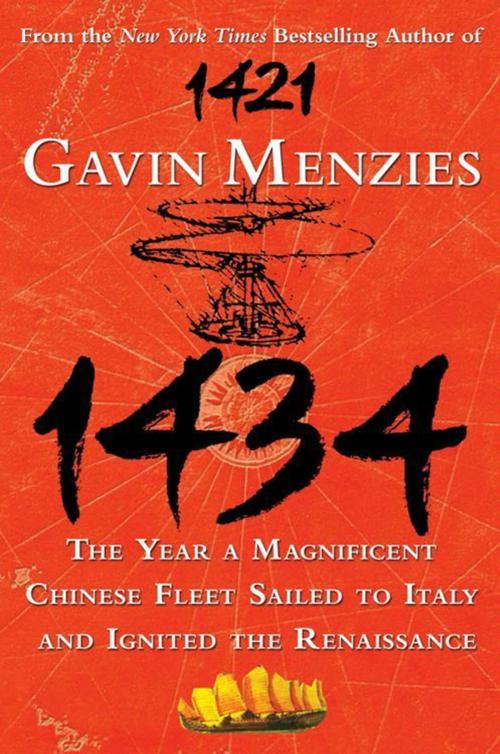1434
The Year a Magnificent Chinese Fleet Sailed to Italy and Ignited the Renaissance
Nonfiction, History| Author: | Gavin Menzies | ISBN: | 9780061983245 |
| Publisher: | HarperCollins e-books | Publication: | October 6, 2009 |
| Imprint: | HarperCollins e-books | Language: | English |
| Author: | Gavin Menzies |
| ISBN: | 9780061983245 |
| Publisher: | HarperCollins e-books |
| Publication: | October 6, 2009 |
| Imprint: | HarperCollins e-books |
| Language: | English |
The New York Times bestselling author of 1421 offers another stunning reappraisal of history, presenting compelling new evidence that traces the roots of the European Renaissance to Chinese exploration in the fifteenth century
The brilliance of the Renaissance laid the foundation of the modern world. Textbooks tell us that it came about as a result of a rediscovery of the ideas and ideals of classical Greece and Rome. But now bestselling historian Gavin Menzies makes the startling argument that in the year 1434, China—then the world's most technologically advanced civilization—provided the spark that set the European Renaissance ablaze. From that date onward, Europeans embraced Chinese intellectual ideas, discoveries, and inventions, all of which form the basis of western civilization today.
Florence and Venice of the early fifteenth century were hubs of world trade, attracting traders from across the globe. Based on years of research, this marvelous history argues that a Chinese fleet—official ambassadors of the emperor—arrived in Tuscany in 1434, where they were received by Pope Eugenius IV in Florence. The delegation presented the influential pope with a wealth of Chinese learning from a diverse range of fields: art, geography (including world maps that were passed on to Christopher Columbus and Ferdinand Magellan), astronomy, mathematics, printing, architecture, steel manufacturing, military weaponry, and more. This vast treasure trove of knowledge spread across Europe, igniting the legendary inventiveness of the Renaissance, including the work of such geniuses as da Vinci, Copernicus, Galileo, and more.
In 1434, Gavin Menzies combines this long-overdue historical reexamination with the excitement of an investigative adventure. He brings the reader aboard the remarkable Chinese fleet as it sails from China to Cairo and Florence, and then back across the world. Erudite and brilliantly reasoned, 1434 will change the way we see ourselves, our history, and our world.
The New York Times bestselling author of 1421 offers another stunning reappraisal of history, presenting compelling new evidence that traces the roots of the European Renaissance to Chinese exploration in the fifteenth century
The brilliance of the Renaissance laid the foundation of the modern world. Textbooks tell us that it came about as a result of a rediscovery of the ideas and ideals of classical Greece and Rome. But now bestselling historian Gavin Menzies makes the startling argument that in the year 1434, China—then the world's most technologically advanced civilization—provided the spark that set the European Renaissance ablaze. From that date onward, Europeans embraced Chinese intellectual ideas, discoveries, and inventions, all of which form the basis of western civilization today.
Florence and Venice of the early fifteenth century were hubs of world trade, attracting traders from across the globe. Based on years of research, this marvelous history argues that a Chinese fleet—official ambassadors of the emperor—arrived in Tuscany in 1434, where they were received by Pope Eugenius IV in Florence. The delegation presented the influential pope with a wealth of Chinese learning from a diverse range of fields: art, geography (including world maps that were passed on to Christopher Columbus and Ferdinand Magellan), astronomy, mathematics, printing, architecture, steel manufacturing, military weaponry, and more. This vast treasure trove of knowledge spread across Europe, igniting the legendary inventiveness of the Renaissance, including the work of such geniuses as da Vinci, Copernicus, Galileo, and more.
In 1434, Gavin Menzies combines this long-overdue historical reexamination with the excitement of an investigative adventure. He brings the reader aboard the remarkable Chinese fleet as it sails from China to Cairo and Florence, and then back across the world. Erudite and brilliantly reasoned, 1434 will change the way we see ourselves, our history, and our world.















